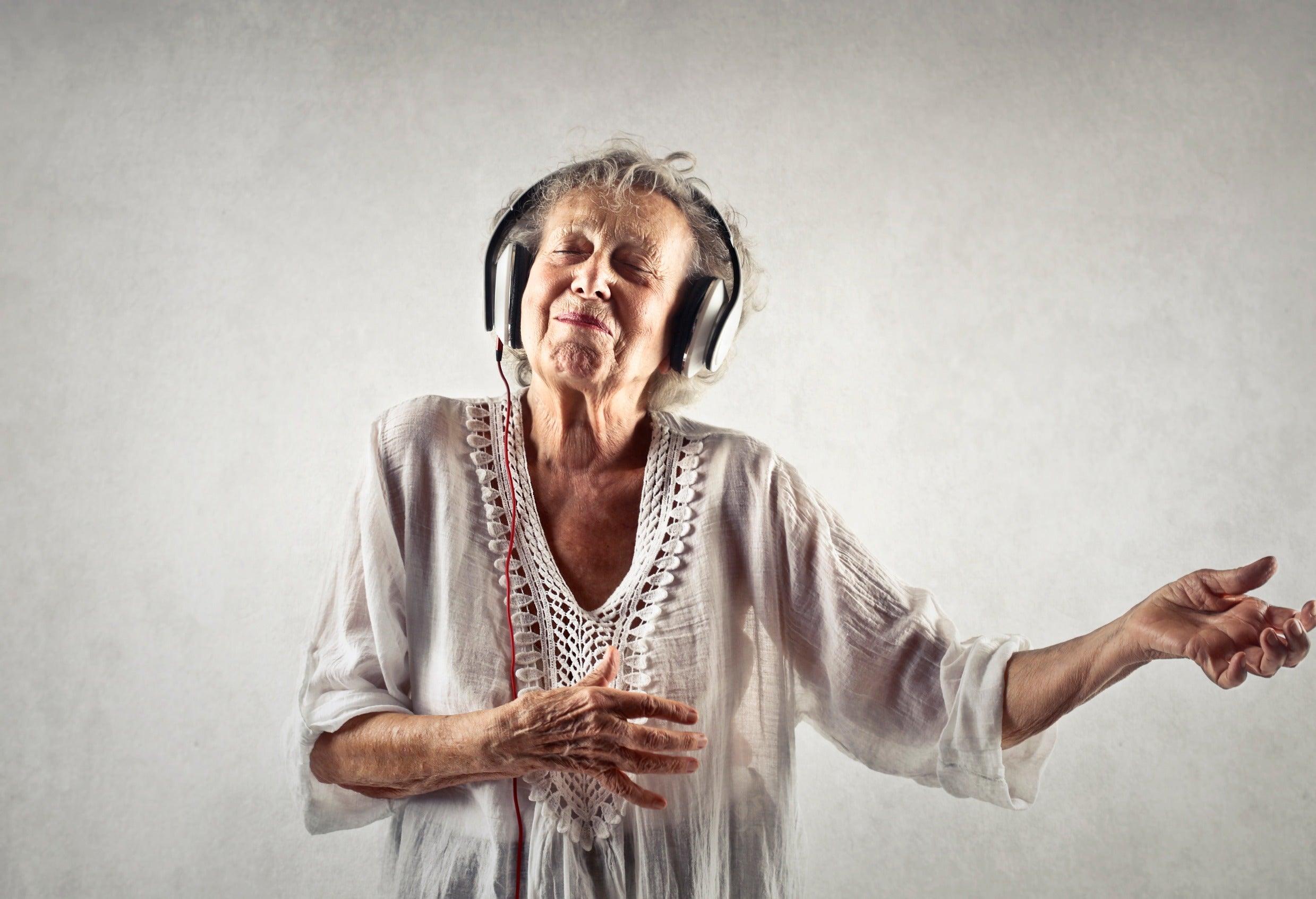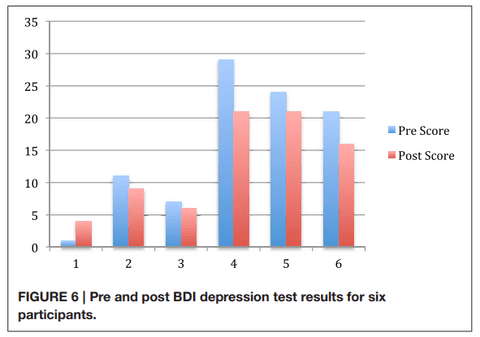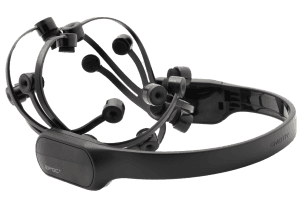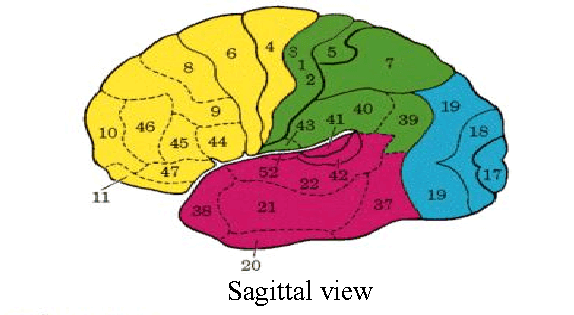Music Neurofeedback Therapy for Treating Senior Depression
Share:





A pilot study used EMOTIV EPOC headsets to allow depressed senior citizens to adjust the volume and tempo of music based on their emotional states.
This neurofeedback approach was shown to improve depression by an average of 17.2% in participants.
The study, published in Frontiers in Neuroscience, suggests that additional research into this music neurofeedback approach is worthwhile.
Researchers at the Universitat Pompeu Fabra in Barcelona, Spain, have developed a neurofeedback technique that uses music as an antidepressant. Ten seniors (9 women, 1 man) volunteered for a study at a senior living center in Barcelona. Participants were chosen because they listened to music often and reported feeling depressed, which was confirmed by the center's psychologist.
Study: How to Treat Senior Depression with Music Therapy
The researchers selected a collection of 5-6 musical tracks for each depressed senior based on an interview about preferences. One by one, each person was fitted with an EPOC EEG headset and seated in front of two speakers, where they listened to music for 15 minutes. The system adjusted the music volume and speed based on the participants' mood, which was determined by their brain activity.
EEG biofeedback is typically only used in a lab setting, where participants have to spend an hour or more in a setup that feels unnatural. EMOTIV EEG neurofeedback devices are wireless, making them ideal for quick setup and use in the participants' living space.
"In the case of our study, the EMOTIV EPOC device has provided several important pragmatic advantages compared with more expensive equipment," wrote Ramirez et al. (2024).
In all, seven participants completed neurofeedback training, requiring a total of ten 15-minute neurofeedback sessions, with no other psychotherapy provided. Four people abandoned the study toward the end because of health problems, the authors noted. Before and after the study, six participants showed an average improvement of 17.2% in their BDI scores.

Fig 6. Pre and post-BCI depression test results for six participants in music neurofeedback study. (Ramirez et al., 2024)
“Analysis of the participants’ EEG data showed a decrease of relative alpha activity in their left frontal lobe, which may be interpreted as an improvement of their depression condition,” writes Ramirez et al. (2024).
The EEG data showed that the overall valence level increased significantly during the neurofeedback treatment.
A Novel Depression Neurofeedback Therapy Approach Using Music
Despite the small sample size, the authors were emboldened by their neurofeedback study results, writing, “The positive results of our clinical experiment, suggest that new research with the proposed music neurofeedback approach is worthwhile.”
The authors suggest that in the future, participants be split into three groups: one with music therapy, one with neurofeedback, and the last group using their proposed combined approach using both neurofeedback treatments and music therapy together.
“In this way, it would have been possible to quantify the added value of combining music therapy and neurofeedback,” they said.
Geriatric or senior depression is the most common mental health condition in adults aged 65 and older (NIH, 2021). Symptoms of depression can be caused by a myriad of factors, such as isolation, chronic pain, medical conditions, and changes in cognitive health. While similar to depression in younger adults, treatment for seniors has many possible causes and treatment options. Neurofeedback is one potential method for providing a better quality of life to seniors who suffer from depression.
References
Depression and older adults. (2021, July 7). National Institute on Aging. https://www.nia.nih.gov/health/mental-and-emotional-health/depression-and-older-adults
Ramirez, R., Palencia-Lefler, M., Giraldo, S., & Vamvakousis, Z. (2015). Musical neurofeedback for treating depression in elderly people. Frontiers in Neuroscience, 9. https://doi.org/10.3389/fnins.2015.00354
Neurofeedback devices in this article:
EP OC X 14-channel EEG headset

You might also enjoy:
Updated July 5, 2024
A pilot study used EMOTIV EPOC headsets to allow depressed senior citizens to adjust the volume and tempo of music based on their emotional states.
This neurofeedback approach was shown to improve depression by an average of 17.2% in participants.
The study, published in Frontiers in Neuroscience, suggests that additional research into this music neurofeedback approach is worthwhile.
Researchers at the Universitat Pompeu Fabra in Barcelona, Spain, have developed a neurofeedback technique that uses music as an antidepressant. Ten seniors (9 women, 1 man) volunteered for a study at a senior living center in Barcelona. Participants were chosen because they listened to music often and reported feeling depressed, which was confirmed by the center's psychologist.
Study: How to Treat Senior Depression with Music Therapy
The researchers selected a collection of 5-6 musical tracks for each depressed senior based on an interview about preferences. One by one, each person was fitted with an EPOC EEG headset and seated in front of two speakers, where they listened to music for 15 minutes. The system adjusted the music volume and speed based on the participants' mood, which was determined by their brain activity.
EEG biofeedback is typically only used in a lab setting, where participants have to spend an hour or more in a setup that feels unnatural. EMOTIV EEG neurofeedback devices are wireless, making them ideal for quick setup and use in the participants' living space.
"In the case of our study, the EMOTIV EPOC device has provided several important pragmatic advantages compared with more expensive equipment," wrote Ramirez et al. (2024).
In all, seven participants completed neurofeedback training, requiring a total of ten 15-minute neurofeedback sessions, with no other psychotherapy provided. Four people abandoned the study toward the end because of health problems, the authors noted. Before and after the study, six participants showed an average improvement of 17.2% in their BDI scores.

Fig 6. Pre and post-BCI depression test results for six participants in music neurofeedback study. (Ramirez et al., 2024)
“Analysis of the participants’ EEG data showed a decrease of relative alpha activity in their left frontal lobe, which may be interpreted as an improvement of their depression condition,” writes Ramirez et al. (2024).
The EEG data showed that the overall valence level increased significantly during the neurofeedback treatment.
A Novel Depression Neurofeedback Therapy Approach Using Music
Despite the small sample size, the authors were emboldened by their neurofeedback study results, writing, “The positive results of our clinical experiment, suggest that new research with the proposed music neurofeedback approach is worthwhile.”
The authors suggest that in the future, participants be split into three groups: one with music therapy, one with neurofeedback, and the last group using their proposed combined approach using both neurofeedback treatments and music therapy together.
“In this way, it would have been possible to quantify the added value of combining music therapy and neurofeedback,” they said.
Geriatric or senior depression is the most common mental health condition in adults aged 65 and older (NIH, 2021). Symptoms of depression can be caused by a myriad of factors, such as isolation, chronic pain, medical conditions, and changes in cognitive health. While similar to depression in younger adults, treatment for seniors has many possible causes and treatment options. Neurofeedback is one potential method for providing a better quality of life to seniors who suffer from depression.
References
Depression and older adults. (2021, July 7). National Institute on Aging. https://www.nia.nih.gov/health/mental-and-emotional-health/depression-and-older-adults
Ramirez, R., Palencia-Lefler, M., Giraldo, S., & Vamvakousis, Z. (2015). Musical neurofeedback for treating depression in elderly people. Frontiers in Neuroscience, 9. https://doi.org/10.3389/fnins.2015.00354
Neurofeedback devices in this article:
EP OC X 14-channel EEG headset

You might also enjoy:
Updated July 5, 2024
A pilot study used EMOTIV EPOC headsets to allow depressed senior citizens to adjust the volume and tempo of music based on their emotional states.
This neurofeedback approach was shown to improve depression by an average of 17.2% in participants.
The study, published in Frontiers in Neuroscience, suggests that additional research into this music neurofeedback approach is worthwhile.
Researchers at the Universitat Pompeu Fabra in Barcelona, Spain, have developed a neurofeedback technique that uses music as an antidepressant. Ten seniors (9 women, 1 man) volunteered for a study at a senior living center in Barcelona. Participants were chosen because they listened to music often and reported feeling depressed, which was confirmed by the center's psychologist.
Study: How to Treat Senior Depression with Music Therapy
The researchers selected a collection of 5-6 musical tracks for each depressed senior based on an interview about preferences. One by one, each person was fitted with an EPOC EEG headset and seated in front of two speakers, where they listened to music for 15 minutes. The system adjusted the music volume and speed based on the participants' mood, which was determined by their brain activity.
EEG biofeedback is typically only used in a lab setting, where participants have to spend an hour or more in a setup that feels unnatural. EMOTIV EEG neurofeedback devices are wireless, making them ideal for quick setup and use in the participants' living space.
"In the case of our study, the EMOTIV EPOC device has provided several important pragmatic advantages compared with more expensive equipment," wrote Ramirez et al. (2024).
In all, seven participants completed neurofeedback training, requiring a total of ten 15-minute neurofeedback sessions, with no other psychotherapy provided. Four people abandoned the study toward the end because of health problems, the authors noted. Before and after the study, six participants showed an average improvement of 17.2% in their BDI scores.

Fig 6. Pre and post-BCI depression test results for six participants in music neurofeedback study. (Ramirez et al., 2024)
“Analysis of the participants’ EEG data showed a decrease of relative alpha activity in their left frontal lobe, which may be interpreted as an improvement of their depression condition,” writes Ramirez et al. (2024).
The EEG data showed that the overall valence level increased significantly during the neurofeedback treatment.
A Novel Depression Neurofeedback Therapy Approach Using Music
Despite the small sample size, the authors were emboldened by their neurofeedback study results, writing, “The positive results of our clinical experiment, suggest that new research with the proposed music neurofeedback approach is worthwhile.”
The authors suggest that in the future, participants be split into three groups: one with music therapy, one with neurofeedback, and the last group using their proposed combined approach using both neurofeedback treatments and music therapy together.
“In this way, it would have been possible to quantify the added value of combining music therapy and neurofeedback,” they said.
Geriatric or senior depression is the most common mental health condition in adults aged 65 and older (NIH, 2021). Symptoms of depression can be caused by a myriad of factors, such as isolation, chronic pain, medical conditions, and changes in cognitive health. While similar to depression in younger adults, treatment for seniors has many possible causes and treatment options. Neurofeedback is one potential method for providing a better quality of life to seniors who suffer from depression.
References
Depression and older adults. (2021, July 7). National Institute on Aging. https://www.nia.nih.gov/health/mental-and-emotional-health/depression-and-older-adults
Ramirez, R., Palencia-Lefler, M., Giraldo, S., & Vamvakousis, Z. (2015). Musical neurofeedback for treating depression in elderly people. Frontiers in Neuroscience, 9. https://doi.org/10.3389/fnins.2015.00354
Neurofeedback devices in this article:
EP OC X 14-channel EEG headset

You might also enjoy:
Updated July 5, 2024
Solutions
Support
Company

© 2026 EMOTIV, All rights reserved.

Your Privacy Choices (Cookie Settings)
*Disclaimer – EMOTIV products are intended to be used for research applications and personal use only. Our products are not sold as Medical Devices as defined in EU directive 93/42/EEC. Our products are not designed or intended to be used for diagnosis or treatment of disease.
Note on Translations: Non-English versions of this website has been translated for your convenience using artificial intelligence. While we strive for accuracy, automated translations may contain errors or nuances that differ from the original text. For the most accurate information, please refer to the English version of this site.
Solutions
Support
Company

© 2026 EMOTIV, All rights reserved.

Your Privacy Choices (Cookie Settings)
*Disclaimer – EMOTIV products are intended to be used for research applications and personal use only. Our products are not sold as Medical Devices as defined in EU directive 93/42/EEC. Our products are not designed or intended to be used for diagnosis or treatment of disease.
Note on Translations: Non-English versions of this website has been translated for your convenience using artificial intelligence. While we strive for accuracy, automated translations may contain errors or nuances that differ from the original text. For the most accurate information, please refer to the English version of this site.
Solutions
Support
Company

© 2026 EMOTIV, All rights reserved.

Your Privacy Choices (Cookie Settings)
*Disclaimer – EMOTIV products are intended to be used for research applications and personal use only. Our products are not sold as Medical Devices as defined in EU directive 93/42/EEC. Our products are not designed or intended to be used for diagnosis or treatment of disease.
Note on Translations: Non-English versions of this website has been translated for your convenience using artificial intelligence. While we strive for accuracy, automated translations may contain errors or nuances that differ from the original text. For the most accurate information, please refer to the English version of this site.
